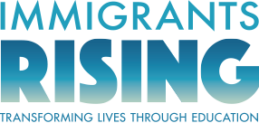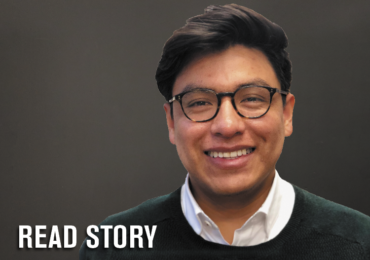Congratulations 2019 Scholars
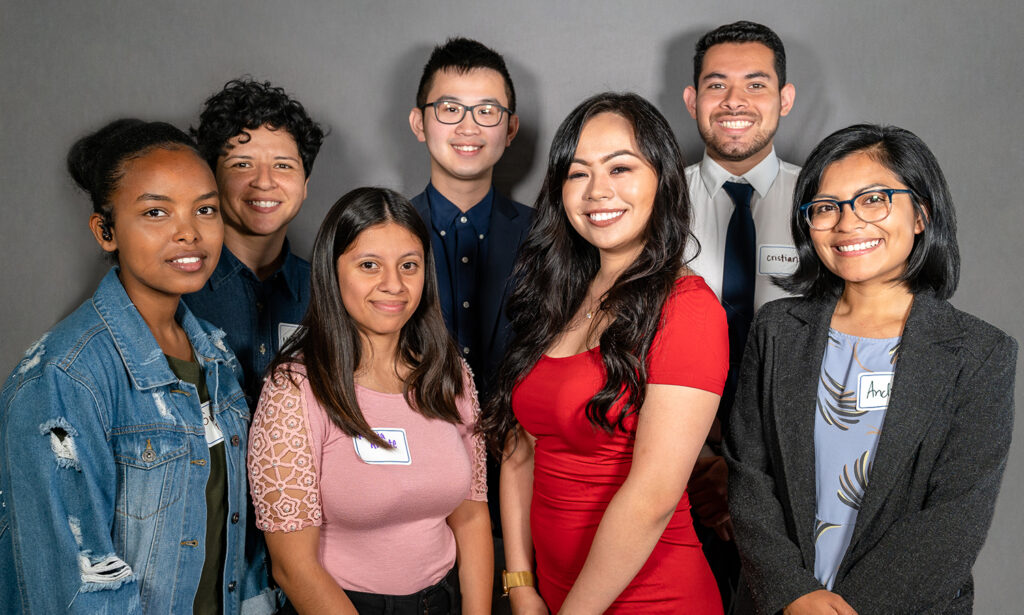
This year, nine extraordinary students are joining our family as recipients of our Scholarship Fund. These scholars have demonstrated resilience and determination in their pursuit of higher education despite extraordinary obstacles and adversity. Their areas of study are: Law, Education, Ethnic Studies, Theater, Migration Studies, Public Health, Graphic Design, American Studies, and Medicine. Welcome, Scholars!
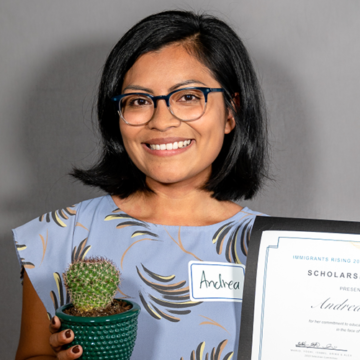
Andrea
“A life largely shaped by limitations did not prevent me from landing a job at a leading non-profit organization or from becoming the first person in my family to pursue a professional degree in the United States. Instead, I pushed through the uncertainty that my immigration status imposed on my life and developed the ethical and practical skills I needed to address my family’s most pressing needs. I learned what it means to be a leader.” — Andrea
Andrea migrated to the U.S. from El Salvador when she was ten years old. She was motivated to pursue higher education because of her mother, who had to give up her university education only a semester away from graduation, in order to bring her children to the United States in the hopes of a better future for them.
“I have taken full advantage of the opportunities that my mother afforded me in abandoning her dreams,” says Andrea. “I now honor her sacrifices by pursuing my academic and professional goals with nothing short of courage and a clear intention for my work.”
Throughout high school and college, Andrea took on multiple service jobs to alleviate her family’s bleak financial situation. She saw first-hand the ways immigrant work is racialized, undervalued, and heavily exploited. She also witnessed rampant workplace violations against her undocumented colleagues, who did not speak up for themselves for fear of deportation and lack of access to legal support. These experiences inspired her to pursue a law career fighting for and protecting the most marginalized.
In June 2015, Andrea was awarded a DreamSF fellowship, through which she was able to provide paralegal services at Dolores Street Community Services for over four years. As a paralegal with their Deportation Defense and Legal Advocacy Program, Andrea worked primarily with Central American women and children. This fall, she started law school at UC Davis where she hopes to continue engaging in advocacy efforts that dare to disrupt some of the most draconian aspects of our legal system.
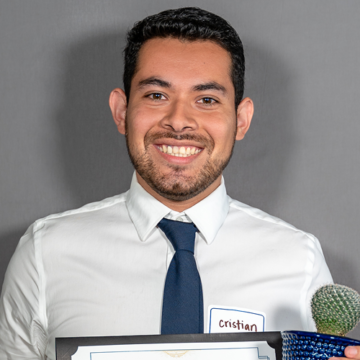
Cristian
“I, too, am afraid of my future; I will continue my education nonetheless. I know I deserve to be here not just for me and my family, but for my community as well.” — Cristian
Cristian knows first-hand the effects of family separation. When he was three, his parents had to leave him and his brother behind with their grandparents when they immigrated to the U.S. Eventually Cristian and his brother were able to join their parents in the U.S., however nine years later their family was separated once again by the broken U.S. immigration system.
When Cristian first moved to the U.S., he felt lost and isolated. Without adequate support and encouragement, it was difficult to make progress in school. He never thought he would be able to go to college, but things changed at the end of high school when he met a college outreach coordinator who encouraged him to apply to De Anza College.
Once at De Anza College, Cristian committed himself to his vision for a future where everyone—regardless of their race, gender, or immigration status—has equal access to education and the resources necessary to succeed. Cristian transferred to UC Berkeley, where he graduated with a bachelor’s degree in Sociology.
While a Teach for America fellow, Cristian taught underrepresented students in a public school in San Jose, California. The day after Trump was elected, he came face to face with a room full of young students who feared for their future and their families. For Cristian, the results of the 2016 presidential election displayed the unremitting obstacles that children experience in public schools. “Immigrant children, many born to undocumented parents, have had to withstand discriminatory policies that have ignored their hixtories and experiences, and have deprived them of an equitable education,” he explains.
Cristian is now pursuing a PhD in Educational Policy at the University of Washington where he is investigating how school administrators can alleviate students’ fears of deportation and family separation. He is also researching the educational experiences of detained undocumented youth and, specifically, how detention centers violate the U.S. Supreme Court’s Plyler v. Doe ruling and the Fourteenth Amendment of the United States Constitution.
Through research, policy, and teaching, Cristian aspires to reduce the negative impact that immigration enforcement policies have on children’s educational trajectories, academic achievement, and social and cognitive development.
Dafne
“Dafne wants to go to college to advocate for equity in our community in every way she can. Her leadership shines through her eloquent and poised presentation style. She is confident, courageous and humble. Dafne gives me hope that our society will be a better place.” — Irene Castillon, Principal Assistant at Dafne’s School
Dafne immigrated to the U.S. at the age of seven. She is a natural-born leader, who has always looked after her family’s needs. In middle school, she and her sister woke up early on Saturdays to do landscaping work with their father. More recently, she began helping her aunt clean houses. Both of these jobs have enabled her to support her family in Mexico and in the States.
Dafne has demonstrated leadership on a variety of social issues outside her family. She was part of Teatro Vision, where she used the power of visual and performing arts to preserve history and create social change. She has also led protests and marches in defense of a clean DREAM Act, helped start the Black Student Union at her school, and facilitated discussions on the history of the N-word and why it’s important to eradicate it. Her favorite subject at school is history, which she sees as an empowering tool that allows her to learn about her past, embrace her identity, and situate social issues within a broader socio-political and economic context. “Dafne’s passion for social justice is something that sets her apart,” explains the Assistant Principal at her school.
Dafne will attend UC Davis this fall and pursue majors in both Ethnic Studies and Theater. She aspires to become a history teacher in order to inspire future generations of black and brown youth to pursue higher education and be active leaders in their communities.
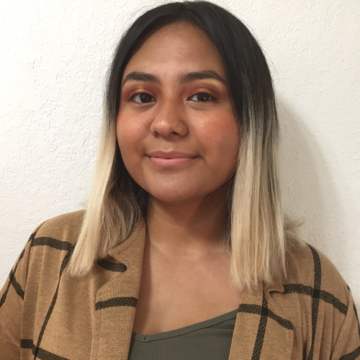
Karla
“As an immigrant and woman of color, Karla has experienced various forms of discrimination. She has been passionate about connecting her personal experiences with others in order to systemic issues. She does not get stuck in a victim mindset, but rather seeks out and creates opportunities to make things better.” — Daniel D. Zarazua, Karla’s Social Studies Teacher
Karla immigrated to the U.S. from Mexico when she was three years old. When she was twelve and living in Kentucky, her father suddenly passed away, marking the most tragic event in her life. Subsequent financial hardships forced her and her mother to relocate to California in order to live with her uncle.
Over the years, Karla has learned to cope with her grief through art and poetry, and developed a sense of empathy that motivates her desire to address social issues in her school and community. She serves as a health educator at La Clinica de la Raza’s Violence Prevention Program, where she facilitates workshops on racial and LGBTQ issues. She is the founder of her school’s “Be the Change Club,” which promotes anti-bullying through art and graphic design; is part of Casa Che, where she helps other teens address mental health and relationship issues; and was part of Helix Medical at UC Berkeley, where she researched PTSD diagnosis and treatment for homeless veterans.
Karla will be attending Mills College this fall. Motivated to help others in need, Karla plans to become a nurse and then go to medical school.
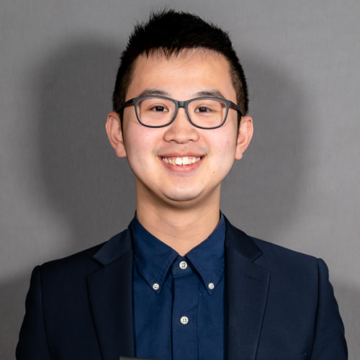
Kenny
“My experience as a migrant and an American tells me that citizenship needs to be re-examined. I think all people have the capacity to become members of a multicultural nation-state community.” — Kenny
Kenny’s migration story begins in the 1980s when his paternal grandparents immigrated to Hong Kong from Guangzhou, China to find employment and better lives for themselves. In 1997, shortly after he and his brother were born, the Asian financial crisis prompted his parents to consider migrating to the United States.
At the age of eight, Kenny moved with his brother and father to San Francisco. But when the Great Recession took place in 2007, Kenny’s father left the U.S., leaving him and his brother in the care of their aunt. That was the last time they ever saw him.
With perseverance, Kenny went on to enroll as an undergraduate student at UC Davis, where he obtained a BA in History and minors in Education and Japanese and volunteered at the AB540 and Undocumented Student Center.
He is now a student in the Master’s Program in Migration Studies at the University of San Francisco. He’s researching Asian and Pacific Islander (API) and undocumented activism, the immigrant experience of the API community in San Francisco, as well as the concept of citizenship and immigration policy. He is also a member of Chinese for Affirmative Action and ASPIRE. In the future, Kenny aspires to be a high school educator, teaching the history of immigration and challenging what it means to be a citizen.
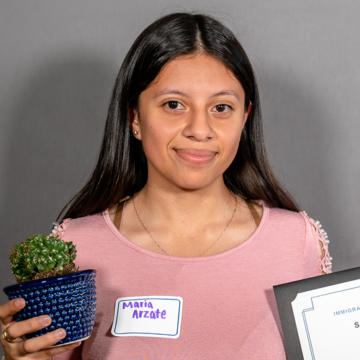
Maria
“Maria is wholeheartedly dedicated to seeing herself and supporting her siblings graduate from college. She is dedicated to helping future generations to create loving, supportive, and just communities.” — Maricela Alvarez, Director of Parent Engagement at Maria’s School
Maria moved to the U.S. when she was six years old. She is the eldest child of five, and from a young age, she learned to advocate for the needs of her family. She recalls accompanying her parents to doctor appointments, translating for them, and helping them fill out paperwork. She mastered the English language at a young age because she had to be the voice for her entire family.
Two years ago, as Maria was preparing to submit her DACA application, the program was suddenly rescinded. Maria initially fell into despair, but with the support of her school and family, she recommitted herself to going to college. She began researching the immigrant rights movement during and after the 1940s, enrolled in history classes at San Jose City College, and learned about historical figures that have advocated for fair immigration laws.
“For the first time, I was able to see myself as someone who could disrupt the cycle of poverty, racism, and xenophobia in my community.” Maria was inspired to be part of a student-led walk-out at San Jose’s City Hall as part of a peaceful demonstration in support of a clean DREAM Act.
“I was able to make my voice heard,” she explains, “Now I want to encourage others to find and use their voice—in English, in Spanish or both—to unite and create change together.”
Maria will be attending CSU East Bay this fall, where she will be studying graphic design. She also plans to attend graduate school to study architecture. Maria is interested in researching the development of fair and affordable housing policies for low-income families like her own. She looks forward to working with other undocumented students to create support systems that empower them in their pursuit of education and citizenship.
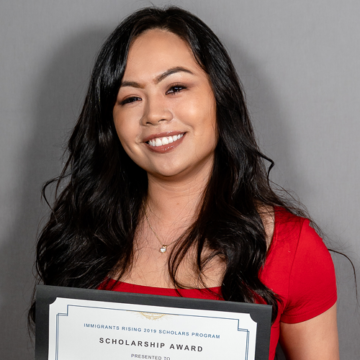
Mariah
“The absence of opportunities for upward mobility has hindered me, but has not stopped me. I trudge forward, not allowing the absence of a nine-digit number to prevent me from turning my ambition into a realized dream.” — Mariah
Mariah recalls growing up in the Philippines, where she was exposed to chaos and gun violence. At age fourteen, Mariah moved to the U.S. with her mother and sister to escape persecution; the Philippines no longer felt like a safe home to them.
“It was not until a few years later that I understood my mother’s analogy,” Mariah recalls. ‘If there is a fire in the kitchen, get out. Don’t suffocate yourself.’”
With less than a thousand dollars in their pockets, Mariah’s family’s initial goal was mere survival in the unfamiliar land of America. One of her biggest challenges was inadequate access to medical care. At age 15, she had to be taken to the emergency room and was concerned about her immigration status being revealed. “I was not afraid of knives piercing my belly,” she remembers. “What was most frightening was the possibility that this could cost us our freedom. After all, we were undocumented and uninsured.” After that experience, Mariah realized that no one should be afraid of accessing medical care due to their immigration status.
This year, Mariah obtained a BA in Integrative Biology from UC Berkeley. Starting this fall, Mariah will begin a master’s program in the School of Public Health at UC Berkeley with a concentration in Health and Social Behavior. Through this program, she is eager to attain a heightened scholarly cognizance of how health-related inequities are perpetuated beyond the walls of a traditional clinic. After her Master’s, she plans to attend medical school to become a physician armed with the cultural and structural competency to eliminate disparities in the US healthcare system.
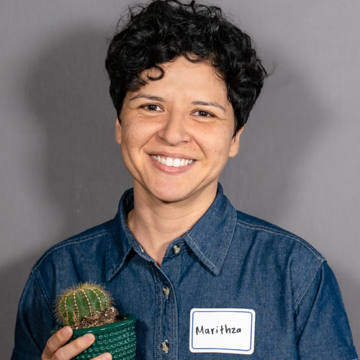
Marithza
“After 22 years in this country, nothing—and everything—has changed. While I still don’t qualify for any immigration remedies, my love of learning has made my life full. I want to contribute to the creation of a culture that values education in all forms, and that empowers others to share their truth.” — Marithza
Marithza moved from Mexico to the U.S. when she was 17 years old. Shortly after arriving in LA, she enrolled in ESL classes. She recalls how empowering it was the first time she had to tell her story in English: “Once I understood that my voice made an impact on other people, I started advocating for adult education”.
Marithza went on to earn her high school diploma and then enrolled in computer graphics courses at a local vocational training center. Later, in order to pay for her tuition at community college, she worked full-time at a printing company.
Four years ago, Marithza learned about Immigrants Rising, which inspired her to move to the Bay Area. Being a part of our Immigrants for Inclusion & Change (I4IC) group motivated her to apply to four-year colleges. “Sharing our stories helped us define ourselves not by our deficits but our strengths,” she recalls.
In the Fall of 2018, after three rounds of college applications, Marithza was able to secure the funds to successfully transfer to UC Berkeley. She is pursuing a major in American Studies and experimenting with innovative ways to merge storytelling and design to promote individual empowerment, creativity and social justice. Marithza plans to pursue an advanced degree in art education. She is looking forward to one day teaching at the college level and publishing her drawings.
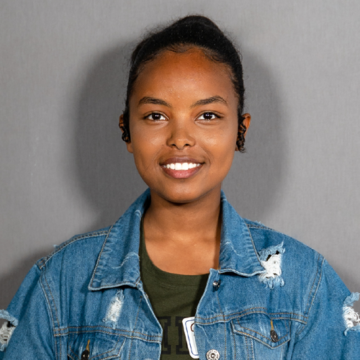
Suzana
“Everyone who encounters Suzana is affected by her humor, intelligence, and thoughtfulness. Suzana has faced more challenges than most students her age, but she has a unique ability to find motivation and inspiration from her past. I know she will go on to succeed anywhere she goes.” — Mallory Moser, Suzana’s Graphics Teacher
Suzana was born in Eritrea and lived there up until she was ten. Her parents were not able to finish elementary school, so Suzana has always been passionate about going as far as possible in her education as a way to honor the sacrifices her mom and dad have made for their family.
In Eritrea, Suzana enjoyed learning new things and getting good grades in school. However, things took a turn when she and her family moved to India. She recalls having difficulty in school, being treated differently, and feeling isolated due to the language barrier. “I wanted to learn English and be one of the top students in my class once again,” she explains. She spent several years closely watching movies, listening to music, and reading in English. Within four years, she went from getting F’s to being the second top student in her eighth grade class.
When she was in ninth grade, Suzana’s family left India and moved to Oakland, California. She started attending Oakland International High School. Due to her outstanding academic performance, Suzana skipped tenth grade and was admitted to UC Berkeley at age sixteen.
Suzana’s teachers describe her as “humble, driven, and inspirational to others.” She has facilitated workshops on a variety of issues, from immigration to gender identity. She has also volunteered over 100 hours as a teacher assistant, helping with grading, administrative work, and lesson plans. Last year, she led the Eritrean Community Walk in Oakland, where she taught her classmates and teachers about Eritrean history, culture, and current migration trends. She is also an intern at Genesys Works, which has allowed her to be financially independent and pay for her family’s electricity and phone bills.
At UC Berkeley, Suzana is interested in studying anatomy and medicine. “As a kid, I saw family members get diagnosed with diseases that couldn’t be cured in our underdeveloped country. It was really sad,” she explains. She wants to use her education to improve medicine and medical access for those who need it most.
